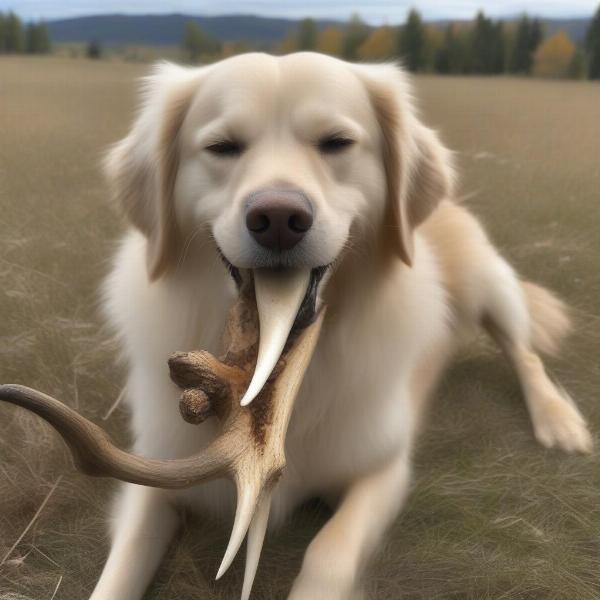Dog chew antlers have become increasingly popular as a natural and long-lasting chew treat. But are they a good choice for your furry friend? This article explores the benefits and potential drawbacks of dog chew antlers, helping you decide if they’re right for your dog. We’ll cover everything from safety concerns to nutritional value, offering practical advice for choosing and using antler chews responsibly.
Understanding the Appeal of Dog Chew Antlers
Antlers for dogs to chew offer a compelling alternative to traditional rawhide or synthetic chews. Their natural origin and touted health benefits appeal to many dog owners seeking a safer and more sustainable option. These chews are typically sourced from elk, deer, or moose, and are naturally shed, making them an environmentally friendly choice. They’re also known for their durability, often lasting much longer than other chew treats, which can be a plus for enthusiastic chewers. But it’s important to understand the potential risks and choose appropriate antler chews for your dog’s size and chewing habits.
 Dog Chewing Antler
Dog Chewing Antler
Are Dog Chew Antlers Safe? Potential Risks and Considerations
While generally considered safe, dog chew antlers do present some potential risks. One key concern is the hardness of the antler. Extremely hard chews can potentially lead to dental fractures, especially in aggressive chewers or dogs with pre-existing dental issues. Another potential hazard is splintering. While less common with high-quality antlers, splintering can occur, and small, sharp pieces can pose a choking hazard or cause digestive upset if swallowed. Choosing the right size and type of antler is crucial to minimize these risks.
Choosing the Right Antler Chew: Size and Type Matter
When selecting deer antlers for dog, size is paramount. A chew that’s too small can be easily swallowed whole, creating a choking hazard. Conversely, a chew that’s too large can be difficult for your dog to manage and may lead to jaw fatigue. Consider your dog’s breed, size, and chewing style. For aggressive chewers, opt for thicker, whole antlers, while less enthusiastic chewers may do better with split or saw-cut antlers that expose the softer marrow inside.
Nutritional Benefits of Antlers for Dogs to Chew
Besides providing mental stimulation and satisfying a dog’s natural chewing instinct, chew antlers for dogs offer some nutritional benefits. They are a natural source of minerals like calcium, phosphorus, and glucosamine, which can support joint health. However, it’s important to note that the primary benefit of antlers lies in their chewing action, not their nutritional content. They should be viewed as a recreational chew rather than a significant source of nutrients in your dog’s diet.
How to Introduce Antler Chews to Your Dog
When introducing reindeer antlers dog, supervision is key. Always monitor your dog while they are chewing on any treat, including antlers. Start with short supervised chewing sessions and remove the antler if it becomes too small or starts to splinter. If your dog is hesitant to try the antler, you can try soaking it in water or broth to soften it slightly and make it more enticing.
Alternatives to Antler Chews for Dogs
If you’re concerned about the potential risks of dog chew antlers, or if your dog simply isn’t interested in them, plenty of other chew options are available. These include bully sticks, natural rubber toys, and dental chews designed to promote oral health. Always choose chews that are appropriately sized for your dog and made from safe, non-toxic materials. chew antlers for dogs
Conclusion: Are Dog Chew Antlers Right for Your Dog?
Dog chew antlers can be a safe and enjoyable treat for many dogs, offering long-lasting chewing satisfaction and some potential health benefits. However, it’s crucial to choose the right size and type of antler and to supervise your dog while they are chewing. moose antlers for dogs By understanding the potential risks and benefits, and by following the guidelines outlined in this article, you can make an informed decision about whether or not dog chew antlers are a suitable choice for your canine companion. reindeer antlers dog
FAQ
- Are all dog chew antlers the same? No, they vary in size, thickness, and source (elk, deer, moose).
- Can puppies chew on antlers? Yes, but choose smaller, softer antlers specifically designed for puppies.
- What if my dog swallows a small piece of antler? While small pieces are usually passed without issue, contact your vet if you notice any digestive upset.
- How long do antlers typically last? This depends on the dog’s chewing habits, but they can last from a few weeks to several months.
- Are antlers a good choice for aggressive chewers? Yes, thicker, whole antlers can be a good option, but always supervise your dog. deer antlers for dogs
- Can antlers help clean my dog’s teeth? While they can provide some abrasive action, they shouldn’t replace regular brushing.
- Where can I buy high-quality dog chew antlers? Reputable pet stores and online retailers specializing in natural pet products are good sources. antlers for dogs to chew
ILM Dog is a leading international dog website dedicated to providing expert advice on all aspects of dog care and wellbeing. From breed selection to health, training, nutrition, and grooming, we offer a comprehensive resource for dog owners worldwide. Our mission is to empower dog owners with the knowledge and resources they need to provide their canine companions with a happy, healthy, and fulfilling life. Contact us today for expert advice: Email: [email protected], Phone: +44 20-3965-8624. Visit ILM Dog for more information.